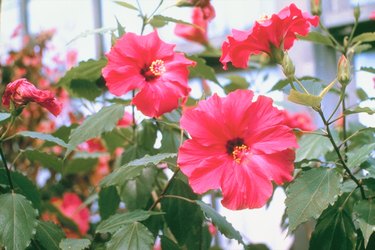
Just as there are different drugs for treating different human ailments, the same holds true when eliminating bugs that attack hibiscus (Hibiscus rosa-sinensis) plants. The best insecticide for hibiscus depends on the type of bug invading the plant. And the best fungicide targets specific fungi – one doesn't eliminate the other. Hibiscus, a tropical flower of many varieties, grows most successfully in U.S. Department of Agriculture hardiness zones 9-11, yet magnificent flowers appear on hardier cultivars in cooler climates from zones 4-9. They attract a number of bugs and fungi and regular monitoring for both is highly recommended.
Basic Hibiscus Care
Video of the Day
As a tropical plant, the hibiscus loves sun and requires full sun for flowering. If newly planted, supplemental water when the soil becomes less than moist is recommended, but once established, a weekly watering is sufficient. You don't want the plant to become waterlogged. Factor in the amount of rain the plant receives when setting your watering schedule. During the summer growing season, a fertilizer with a high middle number (the "P" in NPK) indicating the amount of phosphorus in the mix is best to promote more blossoms, and an iron supplement is needed occasionally.
Video of the Day
Pest control via nature is the best preventative care. Insects such as ladybugs are excellent pest eradicators, as are nematodes. And diseases such as powdery mildew and botrytis can be controlled if caught soon enough. A hard spray from the hose early in the morning chases away pests, and a hard pruning eliminates most diseases.
Best Insecticides for Hibiscus
Just as the name indicates, an insecticide threatens the lives of insects. And when you see ants or other sucking insects, it's time to investigate. Usually found on the leaves or flowers, insects are indicated through the spotty mold appearing on the flowers. An insecticidal soap or horticultural oil is your first method of defense. While chemicals work to eradicate most pests, they also threaten good insects, such as pollinators and insects that prey on insect pests, such as ladybugs and lacewings. Soak the ground with systemic insecticides such as imidacloprid or dinotefuran, which are effective on most sap feeding insects.
Neem oil and commercially blended insecticidal soaps are both safe around bees and support the balance of nature. Soft-bodied insects are threatened by neem, but hard-shelled insects such as beetles need a stronger solution; apply this during warm afternoons if you have an extensive infestation. Parasitic flies and wasps eat beetles and tapping the leaves and letting them fall into a bucket of soapy water also keeps them under control.
Fungicides for a Healthy Hibiscus
Hunt for fungi in the morning before sunrise and in the evening when the sun goes down when dew starts to gather and helps release the fungi. Treat leaf spots with a fungicide containing mancozeb, or you can spray an oil emulsion on the leaves at sundown and in the morning, before the leaves dry out, giving them a hard spray with the hose. Sooty mold and leaf spots should disappear.
Systemic treatment, adding preventatives to the soil, is one way of treating fungus infections but it takes longer to work. It's also effective in controlling the bug populations. Some species of fungi cause root rot, and treatment with Terrazole or Fongarid applied to the soil should help. Also, ease back on the watering of your hibiscus. Iguanas and other lizard-types are a beneficial threat to insects on hibiscus as they prefer hibiscus and its insects for dinner, but also devour your hibiscus flowers. A hard spray with the hose will scare them away.